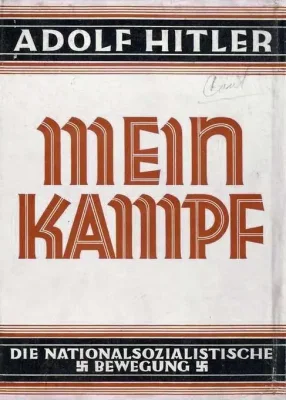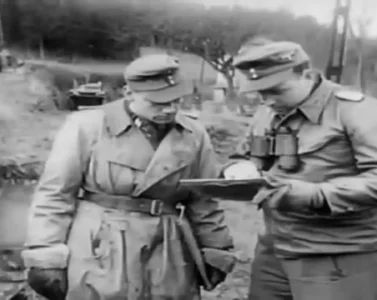- Military Library
- Literature
- WWII Books
- Mein Kampf - My Struggle by Adolf Hitler (1924)
Mein Kampf - My Struggle by Adolf Hitler (1924)
Adolf Hitler's autobiography and political-ideological testament
Mein Kampf (My Struggle) is Adolf Hitler’s autobiography and political-ideological testament, the first volume of which (subtitled A Reckoning) was composed in Landsberg Prison in 1924 and published in July 1925, seven months after his release. A second part, entitled The National Socialist Movement, was added in 1926 and from 1930 the standard edition of Mein Kampf included both parts.
Hitler had been considering committing his thoughts to paper since 1922 and a proposal from Max Amann, the Nazi Party's publisher, that he should write his autobiography while he had the leisure to do so in Landsberg led to this outpouring of his wild surmises about the history and destiny of the German people. Such autobiography as appears in its pages is a mixture of fact and fancy, linking his youthful development to the myth of "Aryan" supremacy to which he had devoted his career. The style of the book is pompous, even illiterate, reflecting the fact that it was dictated in phases with little editorial preparation or planning, though Rudolf Hess, who was better educated than Hitler, assisted by acting as adviser.
The book is oratorical rather than literary and subject to long-winded, tangential departures, such as Hitler's attacks on academic studies, which he compares to a costly, empty envelope. The first volume, A Reckoning, traces Hitler's upbringing in Austria, which he calls a "sham" state whose German elements were subject to inferior racial influences, notably the Jews, and a Social Democratic government so weak that it became the mere tool of the Marxists. He claimed he acquired his anti-Semitism in Vienna and also learned there to despise the system of government through parliamentary debate, favoring in its place outright leadership from the top.
Only through purposive, God-given leadership can the German people rehabilitate their lost racial identity and restate their supremacy in Europe. Once their ethnic supremacy is reestablished, he says, the Germans must acquire much needed territory to the east. But such a reawakening requires urgent propaganda, a new art in politics of which lie had made himself a master. In his celebrated chapter on the subject, Hitler claims that propaganda's appeal must be to emotion, not to reason, and that its aim is to swing the stupid and unthinking masses.
After giving some account of his own experiences, he protests against what he deems the Jewish influence in Germany which led to her betrayal and defeat in 1918. The Jews he calls the source of all degeneracy, with their own special link to Marxism. Hitler stands for purification of the German race, the purging of alien elements from its bloodstream, the expropriation and banishment of the Jews as the parasites and seducers of honest German working people. It is to achieve this, he claims, that he took over the NSDAP.
In the second volume, The National Socialist Movement, Hitler reiterates and enlarges upon the arguments of the first, examining the nature of leadership and its dependence on brilliant oratory. The party he has developed must successfully oppose the Communists, meeting violence with violence and bypassing the timid, democratic bourgeois. He emphasizes the importance of the SA (Sturmabteilung), which inherits the spirit of the Free Corps. Revolution depends on alliance between "a great, creative, renewing idea" and a strongarm force. The Weimar Republic he sees as doomed, a bourgeois "intermezzo" in Germany's postwar development which will soon respond to the leader and his trained supporters.
Sales of Mein Kampf were small prior to 1930: 23,000 of Volume I and 13,000 of Volume II. An inexpensive "People's Edition" appeared in 1930 and by 1932 its sales totaled 194,000. By the end of 1933 (the first year of Hitler's Chancellorship) 1.5 million copies had been sold and it has been estimated that sales amounted to 8 or 9 million during Hitler's lifetime. Presentation copies were frequently ordered (for example, for every bridal couple). Several versions of Mein Kampf appeared in English in the United States and Britain and it was translated into the principal European languages as well as Arabic, Tamil and Japanese.
- Germany - Weimar Republic (1919-33)
- Germany Nazi (1933-1945)
- {{#owner}}
- {{#url}} {{#avatarSrc}}
{{name}} {{/url}} {{^url}} {{#avatar}} {{& avatar}} {{/avatar}} {{name}} {{/url}} - {{/owner}} {{#created}}
- {{created}} {{/created}}

























